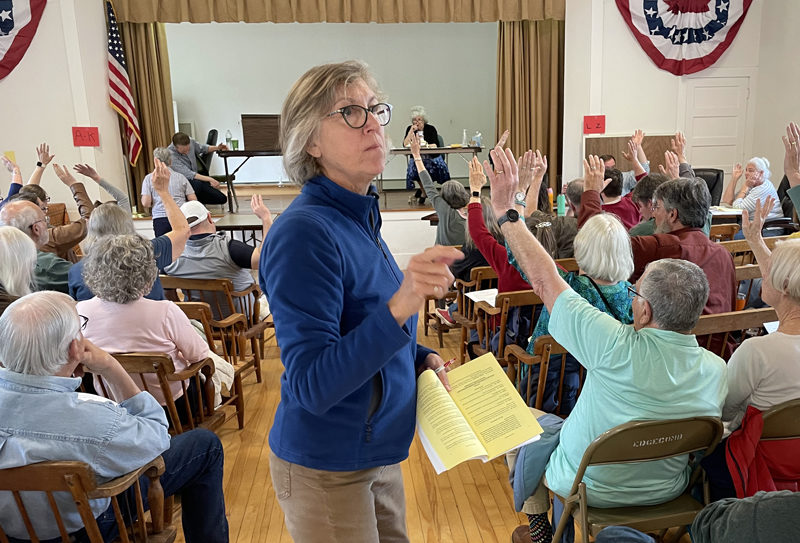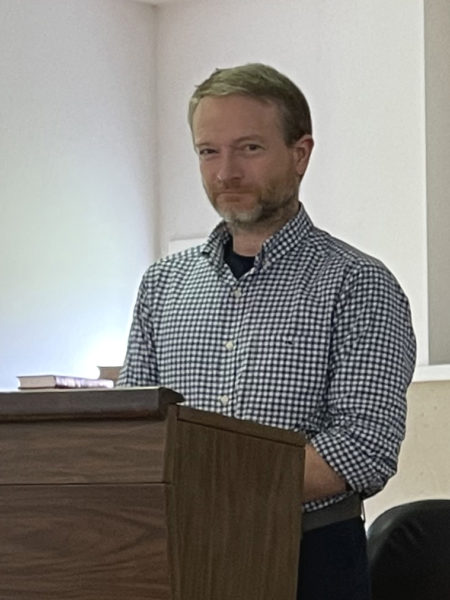
Ballot clerk Paula Swetland counts votes during Edgecomb’s annual town meeting Saturday, May 18. Following an extended debate, residents narrowly agreed to create a full time fire chief position, voting with a show of hands, 33-31. (Sherwood Olin photo)
Edgecomb residents packed into the town hall for their annual town meeting Saturday, May 18, working their way through a 66-article warrant in slightly under four hours. In the end, almost every article passed as written, however, public comments made it clear Edgecomb residents were feeling the financial pain.
As approved, the municipal budget totals $5,556,294.84, a $145,473.84 or 2.6% increase.
Agreeing to create a full-time fire chief position for the first time in the town’s history, voters set the stage for a special town meeting to follow in June when they will need to reconvene to finalize financial details for the position ahead of the start of the town’s fiscal year.
The article proposing a full-time fire chief passed with a show of hands, 33-31, after 45 minutes of debate.
Making the case for the article, Edgecomb Fire Chief Roy Potter and members of the fire department said having a full-time chief in town would help improve response time and make sure Edgecomb has some coverage during working hours.
Potter said the department has been trying to make it work with a part-time chief for several years now, but the size of the department and the call volume are problematic. Currently the department is down to 12 members and often there is no coverage available in Edgecomb during working hours, Potter said.
“If I don’t have anybody to respond to the call during the day, I don’t have fire protection and I’ve been told that ‘Oh somebody will come and help me,’ and they will, but it’s a delay,” Potter said. “The delay is if we get paged out, the (Lincoln County Communications Center) waits two minutes then they page us again. After that they’ll page mutual aid. If you are upside-down in a car like we had up here on Route 27, those minutes are crucial.”

Moderator Jon Pottle presides over Edgecomb’s annual town meeting on Saturday, May 18 in the town hall. (Sherwood Olin photo)
The article was not recommended by the Edgecomb Select Board. Chair Mike Smith, who did not seek reelection this year, said Potter presented the board with a job description and a dollar figure, but the board felt the decision to create a full-time fire chief’s position should be made by the voters. Stressing the board’s respect for Potter, Smith said the position should be developed for the open market.
Potter’s figures attached a $62,000 figure and three-week vacation but did not include benefits as Potter has coverage as retired military, Smith said.
“The conversation that was had with the budget committee, you know if we were going to fill that position, if we were in fact ever going to get a full-time fire chief we would most likely tie into the job description the chief submitted with an independent job description,” Smith said. “Most likely, it’s $62,000 a year plus benefits, because Roy may not be the fire chief.”
If voters approve, Smith said the select board would have to come up with a budget figure and a job description and come back to the town for approval during a special town meeting. Town clerk Claudia Coffin advised the financial figures needed to decided by July 1 when the town’s tax commitment begins. According to comments from the board, the earliest a special town meeting could be called is Friday, June 14.
In a related decision, with Potter’s recommendation, voters rejected a $57,511.37 warrant article that would have funded fire department salaries and the employer’s share of taxes. With a special town meeting likely coming next month to adopt employment standards for the fire chief, Potter recommended rejecting the article, indicating the department will present revised figures at that special town meeting.
In a related article, voters amended at $33,136.77 appropriations article funding the fire truck reserve fund, reducing the amount to $20,000 before passing it.
Despite some residents questioning the town’s education cost per pupil, Edgecomb voters passed the $3,760,261 education budget intact, agreeing to appropriate $2,176,821.11 and raise $1,755,293, of which $1,343,379 exceeds the state’s Essential Programs and Services model. Voters agreed to exceed the state’s Essential Programs and Services model via a 31-4 written ballot vote.
As approved, the total budget is an increase of $344,096 or 10.07%, with $3,098,672 to be raised through taxation, itself an increase of $551,072, or 21.63%.
Edgecomb School Committee Chair Heather Sinclair acknowledged the pain voters expressed, but said the issue is with the state’s method of funding education. Edgecomb is due for a reevaluation, which could result in a more equitable distribution of local taxes.
“It is an incredibly challenging situation,” Sinclair said. “We have spent a lot of time looking at this exact question of ‘how do you adequately fund public educations, which everyone wants to do, without putting individual taxpayers in small towns in position where they are carrying everything?”
Among the school articles, voters agreed to spend $2,181,157 for regular instruction; $731,020 for special education; $2,800 for other instructions; $110,460 for student and staff support; $123,554 for system administration; $209,029 for school administration; $100,317 for transportation and buses; and $276,924 for facilities and maintenance.
Voters also authorized the school committee to appropriate $150,000 for the unassigned fund balance to be placed in a capital improvement reserve account and authorized the committee to appropriate $50,000 from the unassigned fund balance to be place in the student expense reserve. Sinclair successfully motioned the latter figure down from $200,000.
The town also passed extensive amendments to the town’s land use ordinance, adding language to bring the standards in line with L.D. 2003. The changes amend the town’s shoreland zoning overlay, and supplementary ordinance, affecting dwellings in the shoreland zone. Other language codifies and regulates accessory dwelling units.

Edgecomb Fire Chief Roy Potter responds to a call about two hours into Edgecomb’s annual town meeting Saturday, May 18. Before the call, Potter successfully lobbied the town to adopt a full-time fire chief. (Sherwood Olin photo)
In other decisions voters agreed to raise and appropriate $179,000 and appropriate $200,000 from surplus for a snowplowing contract, as well as raise another $80,192 for repairs and maintenance of the town highways and $300,000 for road repair paving projects.
Without opposition voters approved spending $176,033 for Edgecomb’s share of the Boothbay Region Refuse Disposal District.
Voters also approved spending $140,566.75 for town officer salaries, creating an administrative assistant position and bestowing 4% raises across on board on the stipends paid to town officers.
Exceptions include a $3,000 reduction in the code enforcement officer salary and raises for the tax collector, treasurer, and town clerk. Smith said the tax collector will be paid $26.50 for 22 hours a week and the town clerk and treasurer are budgeted for $28 an hour, 20 hours a week. Smith pointed out all three positions bear a lot of responsibility and do not get vacations, days off, or benefits.
“We think it’s really important to get people downstairs, that are comfortable being downstairs that want to deal with us, and they want to stay,” Smith said. “So that’s what we’re left with.”
In municipal polling on Friday, May 17, voters elected former Edgecomb Code Enforcement Officer George Chase to a three-year term on the select board. Succeeding Smith, who stepped after down nine years, Chase defeated Timothy L. Harrington 92-7 in the only declared race on the ballot.
Rebecca Graham and Leah Taylor were both reelected unopposed to three-year terms on Edgecomb Planning Board, receiving 93 and 92 votes, respectively.
Coffin was reelected to a one-year term as town clerk with 94 votes and reelected to a one-year term as Edgecomb treasurer with 91 votes. Scott Griffin was reelected to a one-year term as road commissioner, receiving 93 votes, and Irene Marchenay was reelected to a three-year term on the Edgecomb School Committee with 85 votes.



